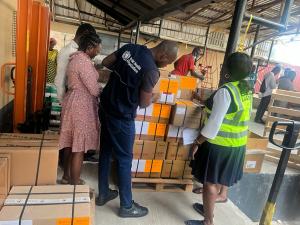Rallying action to curb cholera in Nigeria’s Lagos state
Lagos – Comfort Ajayi, a mother of three and resident of Lagos state says she is keenly observing hygiene and taking steps to protect her family from cholera, which has been reported in all the 20 localities of Nigeria’s second most populous state. “In this critical time, I am also guiding my children on how to live responsibly,” she says.
Health authorities declared a cholera outbreak in Lagos on 15 June 2024 when 436 suspected were reported. Six days later, there were more than 500 suspected and 43 confirmed cases, with a 5.4% case fatality rate among the suspected cases reported.
Cholera is an acute and virulent infection. It can spread rapidly and cause high morbidity and mortality. It is, however, easily treatable with prompt administration of oral rehydration solution or intravenous fluids. Prevention mostly consists of providing clean water and proper sanitation to populations who do not yet have access to basic services, as well as vaccination with oral cholera vaccines. Health education and good food hygiene are also essential.
Focusing on halting community transmission, Nigerian health authorities, with support from the World Health Organization (WHO) and partner organizations are working with community health outreach teams to ensure prevention and control measures, ranging from public health education to epidemiological interventions, are implemented effectively.
Multisectoral partnerships are key to the outbreak response. “Collaboration with the Ministry of Environment as well as coordination with partners are helping to bolster community sanitation efforts and outbreak control,” says the Lagos State Commissioner for Health, Professor Akin Abayomi,
Since the start of the outbreak WHO field volunteers and local government facilitators have been deployed to bolster the overall outbreak response across hotspots. Ordinarily, their work is to ensure that local coordination is strengthened and suspected cases of vaccine-preventable diseases are reported in a timely manner.
“I am glad that health workers in my area are providing us with the preventive information such as posters and text messages that are guiding us on how to protect ourselves and loved ones,” says Ajayi, who lives in Eti Osa, one of the most affected localities in Lagos state.
Dr Chinenye Okafor, WHO State Coordinator, who is leading the Organization’s community-based support, says that activities such as orientation training, on-the-job mentoring, high-level advocacy and strengthening of surveillance, case management, laboratory, risk communication and community engagement and operations logistics are being enhanced to end the outbreak.
More than 350 field volunteers, including WHO-supported local government facilitators, have been deployed and are carrying out public health education and active case finding in health facilities and communities, as well as on-the-job mentoring to primary health care workers. This operational approach is geared towards reducing morbidity and mortality in the community.
“Lagos is the most populous city in Africa and the outbreak is a major concern. Since the activation of the Emergency Operations Centre, WHO is coordinating partners to swiftly support the state in saving the lives of vulnerable people in the affected local government areas,” says Dr Okafor.
With funding from the Canadian Government (CANGiVE), WHO is supporting the community outreach efforts. The Organization has also provided 35 essential emergency community and periphery cholera kits, which can treat at least 5250 people.
“While the Government of Nigeria, along with partners, is working hard to contain the outbreak, it is important for all stakeholders to rally round the government to support it to halt community transmission and save lives,” says Dr Walter Kazadi Mulombo, WHO Representative in Nigeria. “Controlling a cholera outbreak requires a multifaceted approach, using surveillance, water, sanitation and hygiene measures, risk communication/social mobilization, timely treatment and oral cholera vaccines.”
Cholera is both a health problem and a socioeconomic development challenge, requiring a robust multisectoral response. The long-term solution for cholera control lies in economic development and universal access to safe drinking water and basic sanitation.
“I was sceptical about the appropriate preventive measures for cholera, but the health care workers boosted my confidence with the right information” says Basirat Tanimu, a community member in Eti Osa. “Now, I am constantly advocating to my neighbours on the importance of keeping the environment clean, to keep ourselves and children safe.”



